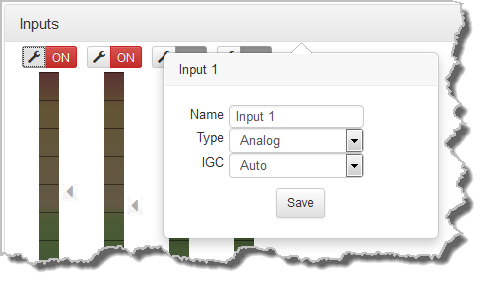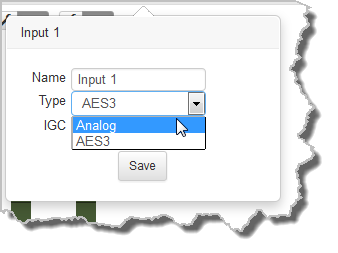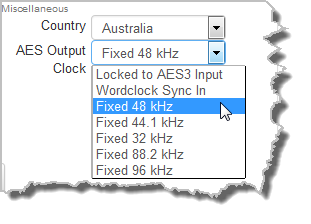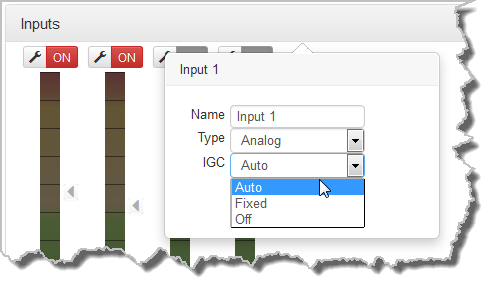Configuring Input/Output Settings
Open the HTML5 Toolbox Web-GUI and click Inputs to display the Inputs panel.
|
Important Note: 15 volt phantom power can only be supplied on the Auxiliary input; this is disabled by default. |
Configuring Input Channel Settings
Renaming Input Channels:
1.Click the Input Settings ![]() symbol on the input you want to rename.
symbol on the input you want to rename.
2.Click in the Name text box to enter a new name, or edit an existing name.

3.Click Save to confirm the name change.
Selecting Analog and Digital Audio Sources:
Codec inputs are configured for analog line level audio sources by default.
1.Click the Input Settings ![]() symbol.
symbol.
2.Select Type and click to select either Analog or AES3.

3.When you select AES3, an input is automatically configured for 100% input levels; input level and input on/off controls are unable to be adjusted.
|
Important Note: Input levels can only be adjusted on analog inputs. See Configuring AES3 Input Audio for more information about the digital inputs and outputs. |
Setting Analog Audio Levels
Audio levels on the Input panel should be set to ensure audio peaks average at the first yellow indications on the PPM meters, which represents +4dBu. These levels should also be checked against the Input PPM Meters on the Master panel.
Other Input Controls
Adjust the IGC (Intelligent Gain Control) input settings to Auto, Fixed or Off as required. |
|
|
Important Note: When the auxiliary input (AUX IN) is On the default mixer configuration sends audio to all inputs. If you are not using the auxiliary input ensure it is Off to avoid additional noise in program audio. |
AES3 Output Sample Rate Configuration
The AES3 output sample rate can be configured using the HTML5 Toolbox Web-GUI.
1.Open the HTML5 Toolbox Web-GUI and click Settings, then click Options to open the Options panel.
2.Click the Edit button to configure settings.
3.Click the AES Output Clock drop-down menu to select your preferred AES Output Clock setting, then click Save.


